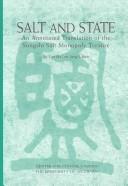| Listing 1 - 10 of 10 |
Sort by
|
Book
ISBN: 9088908176 908890815X 9088908168 Year: 2019 Publisher: Leiden : Sidestone Press,
Abstract | Keywords | Export | Availability | Bookmark
 Loading...
Loading...Choose an application
- Reference Manager
- EndNote
- RefWorks (Direct export to RefWorks)
Salt industry and trade. --- Salt industry and trade --- History.
Book
Year: 2010 Publisher: Washington, DC : U.S. International Trade Commission,
Abstract | Keywords | Export | Availability | Bookmark
 Loading...
Loading...Choose an application
- Reference Manager
- EndNote
- RefWorks (Direct export to RefWorks)
Book
Year: 2009 Publisher: Washington, DC : U.S. International Trade Commission,
Abstract | Keywords | Export | Availability | Bookmark
 Loading...
Loading...Choose an application
- Reference Manager
- EndNote
- RefWorks (Direct export to RefWorks)
Book
Year: 1858 Publisher: [Washington, D.C.] : [publisher not identified],
Abstract | Keywords | Export | Availability | Bookmark
 Loading...
Loading...Choose an application
- Reference Manager
- EndNote
- RefWorks (Direct export to RefWorks)
Claims. --- Malicious mischief. --- Vandalism. --- Merchant ships. --- Requisitions, Military. --- Salt industry and trade. --- Salt. --- United States --- History
Book
Year: 1838 Publisher: [Washington, D.C.] : [publisher not identified],
Abstract | Keywords | Export | Availability | Bookmark
 Loading...
Loading...Choose an application
- Reference Manager
- EndNote
- RefWorks (Direct export to RefWorks)
Breach of contract. --- Claims. --- Leases. --- Salt industry and trade. --- Salt. --- Indians.
Book
Year: 1919 Publisher: [Washington, D.C.] : Washington : Department of the Interior, United States Geological Survey, Government Printing Office.
Abstract | Keywords | Export | Availability | Bookmark
 Loading...
Loading...Choose an application
- Reference Manager
- EndNote
- RefWorks (Direct export to RefWorks)
Mines and mineral resources --- Salt deposits --- Salt industry and trade --- United States.
Book
Year: 1839 Publisher: [Washington, D.C.] : [publisher not identified],
Abstract | Keywords | Export | Availability | Bookmark
 Loading...
Loading...Choose an application
- Reference Manager
- EndNote
- RefWorks (Direct export to RefWorks)
International law. --- Foreign trade promotion. --- Foreign trade and employment. --- Governmental investigations. --- Salt industry and trade. --- Salt. --- Tariff. --- Economic aspects.
Book
Year: 1830 Publisher: [Washington, D.C.] : [publisher not identified],
Abstract | Keywords | Export | Availability | Bookmark
 Loading...
Loading...Choose an application
- Reference Manager
- EndNote
- RefWorks (Direct export to RefWorks)
Duty-free importation. --- Foreign trade promotion. --- Foreign trade and employment. --- Imports. --- Protectionism. --- Salt industry and trade. --- Salt. --- Tariff.
Book
Year: 1834 Publisher: [Washington, D.C.] : [publisher not identified],
Abstract | Keywords | Export | Availability | Bookmark
 Loading...
Loading...Choose an application
- Reference Manager
- EndNote
- RefWorks (Direct export to RefWorks)
Bank deposits. --- Economic history. --- Executive power. --- Banks and banking. --- National banks (United States) --- Presidents. --- Finance, Public. --- Salt industry and trade. --- Jackson, Andrew, --- United States. --- Powers and duties.

ISBN: 0892641630 0472901451 Year: 2004 Publisher: Ann Arbor : Center for Chinese Studies, University of Michigan,
Abstract | Keywords | Export | Availability | Bookmark
 Loading...
Loading...Choose an application
- Reference Manager
- EndNote
- RefWorks (Direct export to RefWorks)
From its inception in the Han dynasty (206 B.C.-220 A.D.), the salt monopoly was a key component in the Chinese government's financial toolkit. Salt, with its highly localized and large-scale production, was an ideal target for bureaucratic management. In the Song dynasty (960-1279), fiscal pressures on the government had intensified with increased centralization and bureaucratization. A bloated administration and an enormous standing army maintained against incursions by aggressive steppe neighbors placed tremendous strain on Song finances. Developing the salt monopoly seemed a logical and indeed urgent strategy, but each actor in this plan -- the emperor, local officials, monopoly administrators, producers, merchants, and consumers -- had his own interests to protect and advance. Thus attempts to maximize the effectiveness of the monopoly meant frequent policy swings and led to levels of corruption that would ultimately undo the Song. Unlike other contemporary sources, the 'Songshi' treatise organizes its subject into an intelligible and detailed narrative, elucidating special terminology, the bureaucracy and its processes, and debates relating to Chinese finance and politics, as well as the salt industry itself. Professor Chien's extensive annotation relies on parallel histories that corroborate and supplement the 'Songshi' account, together providing a comprehensive study of this important institution in China's premodern political economy. Cecilia Chien is Assistant Professor in the Division of Humanities at the Hong Kong University of Science and Technology.
Government monopolies --- Salt industry and trade --- History. --- Song shi. --- China --- History --- Nonmetallic minerals industry --- Monopolies, Government --- State monopolies --- Government business enterprises --- Government ownership --- Monopolies --- Monograph on salt in the Shihuozhi of the Songshi --- Songshi salt monopoly treatise --- S10/0401 --- China: Economics, industry and commerce--Salt monopoly (incl. Yantielun)
| Listing 1 - 10 of 10 |
Sort by
|

 Search
Search Feedback
Feedback About UniCat
About UniCat  Help
Help News
News